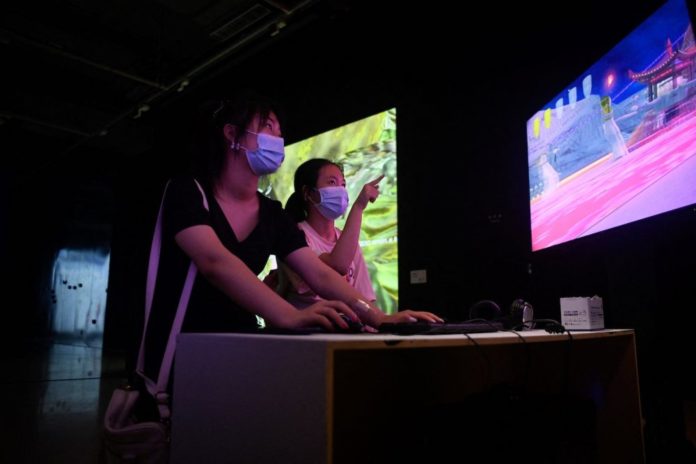
Welcome to Foreign Policy’s China Brief.
The highlights this week: China introduces new regulations on how much time minors can spend playing video games, the details of the case against Canadian detainees Michael Spavor and Michael Kovrig are revealed, and U.S. climate envoy John Kerry travels to Beijing for talks.
If you would like to receive China Brief in your inbox every Wednesday, please sign up here.
China Restricts Video Game Time
China’s new regulations on how much time minors can spend playing online video games took effect today, restricting young people to just three specific hours per week: between 8 and 9 p.m. on Fridays, weekends, and holidays. Companies are expected to enforce the regulations, and, as usual, firms such as Tencent have no choice but to endorse the state’s new impositions.
A previous law already limited online game time to 90 minutes per day on weekdays; the latest tightening reflects the state’s wider paranoia about losing control over young people.
Video games have long bothered both parents and the Chinese leadership. Between 2000 and 2014, China officially banned the sale and import of video game consoles, although they remained widely available. Some parents turned to so-called gaming addiction camps. But it seemed like the government had at last reconciled with the financial possibilities of the video game market, opening space for Chinese gaming while maintaining controls over content.
The new restrictions are part of a wider crackdown on celebrity culture and entertainment that is framed in clearly ideological terms—illustrated by a recent essay by a nationalist blogger that was republished by all major state media, including Xinhua and the People’s Daily. In the essay, Li Guangman calls for a “profound revolution.” “[C]apital markets will no longer be paradise for get-rich-quick capitalists, cultural markets will no longer be heaven for sissy-boy stars, and news and public opinion will no longer be in the position of worshipping Western culture,” he writes.
Li, an ex-editor for a minor trade publication, will likely slip back into obscurity. But the state sanctioning of his words raises concerns. The essay positions the United States as the main enemy, suggesting that it is raising a fifth column within China and waging a multisector war against the country—including “biological warfare,” a reference to the conspiracy theories China has pushed about the U.S. military being responsible for COVID-19.
The infiltration of Western ideas through culture and entertainment is an ongoing concern of the Chinese state—sometimes intensifying, sometimes diminished. Although it’s always been a part of Chinese President Xi Jinping’s rule, the recent moves indicate a ramping up of ideological paranoias. The video games and fan clubs are mostly not Western-made, but the form itself is seen as a dangerous opportunity for foreign division. A recent Global Times piece, for example, calls celebrity fan clubs “the target of overseas forces to split Chinese society.”
In recent years, Chinese state media has talked up a supposed masculinity crisis, linked to both fan culture and video game addiction. Young people, and especially boys, are seen as especially vulnerable to this influence and to becoming physically weak and unmasculine as a result. Likewise, the Li piece mentions “stamping out pretty-boy and sissy-boy tendencies in our national character”—in part a reference to influential pop stars such as Kris Wu, recently arrested on rape charges, who have long been the target of official tut-tutting.
Moreover, it is not just pop stars who have been singled out but also ordinary streamers perceived as gay. China is largely liberal on LGBT issues, and the public has successfully pushed back on censorship. But recent shutdowns of LGBTQ accounts, the blocking of related terms on some social media platforms, and demands at universities to record the numbers of LGBTQ students reflect an undercurrent of state homophobia.
The video game restrictions are a small part of this effort to create supposedly healthy youth: studious, straight, and nationalistic. The next step is likely to be a similar crackdown on the lives of college students and a new round of compulsory militaristic exercises for high schoolers.
What We’re Following
Two Michaels’ charges revealed. After three years of imprisonment, the details of the charges against Michael Kovrig and Michael Spavor, the two Canadians seized in retaliation for the arrest of Huawei Chief Financial Officer Meng Wanzhou, have been revealed. An unnamed source in a Global Times article said Spavor was charged with taking pictures of Chinese military installations and passing them to Kovrig, who is also accused of writing reports on “second-tier state secrets.”
The move is an attempt to justify Beijing’s hostage diplomacy, which has wrecked China’s reputation in Canada, where just 14 percent of people now have a positive view of the country. The photos narrative is probably a lie, but espionage and state secret laws in China are broad enough to allow the arrest of virtually anyone.
Chinese state media continues to frame Meng, who is under a largely nominal house arrest in Vancouver, British Columbia, as a martyr as her lawyers fight extradition to the United States on fraud charges. Kovrig and Spavor, meanwhile, have been held in solitary confinement and without access to lawyers or consular officials for long stretches.
More restrictions on ethnic minorities likely. A central conference on ethnic affairs last week featured a statement from Xi that the Chinese Communist Party’s “supremacy over ethnic work must be upheld” and minorities’ “sense of identity and national pride” boosted. That rhetoric likely signals more repressive measures to come, ranging in intensity from the atrocities in Xinjiang to the attempts at abolishing Mongolian-language education that caused mass protests last year.
China’s original ethnic policy, borrowed from the Soviet Union, saw the brutal repression of supposed separatists and the betrayal of ethnic minority communist leaders who were promised independence or meaningful autonomy. However, they were also allowed the space for cultural and linguistic preservation—something that has disappeared fast.
The reassertion a month ago of Mandarin-language education in Inner Mongolia is a particularly strong signal. Not only were Mongolians a seen as model minority, but the scale of last year’s protests also would likely have caused a rethink of the policy in the pre-Xi era.
Kerry heads to China. Special U.S. climate envoy John Kerry is headed to Beijing for talks with Chinese officials. Those pushing for climate cooperation and the toning down of the U.S.-China conflict have often seen Kerry as a representative, although he’s talked of the need for skepticism himself. There are counterarguments that China’s limited cooperation on climate is directed toward essentially geopolitical goals, not climate ones—or that U.S.-China competition may be a more effective way forward.
Tech and Business
Famous actress wiped from internet. Zhao Wei, one of China’s most famous actresses, has had much of her online presence vanish in the last week, with content removed from social media, her name scrubbed from TV and film credits, and some of her shows and films taken down from streaming services. A now-deleted post on her Instagram account denied that she had fled to France.
The campaign against Zhao is probably linked to her husband, Huang Youlong, a multimillionaire businessman. Huang is reportedly in financial trouble, but, more importantly, the couple were big investors in Alibaba, the technology giant that became one of the first targets of the recent regulatory crackdown. Huang and Zhao also have ties in Hangzhou, Alibaba’s hometown, where a political purge began last week.
Such disappearances were a regular part of life in the Soviet Union, but they are particularly surreal in an era of internet celebrity. All this comes before any formal or public charges have been brought against Zhao. It’s reminiscent of the sudden disappearance of Rui Chenggang, one of China’s most famous news anchors, who vanished in 2014 before criminal charges were brought against him in 2016.
Financial news crackdown. Three major sites recently published regulator-mandated announcements that they would work to “purge fake financial news.” Some concerns are legitimate, such as pump-and-dump schemes and fake consultants. But the pledge singled out talking up short selling and doom-mongering about the state of the economy, as well as “distorted interpretation” of data.
Financial reporting in China has often been able to escape censorship, even during crackdowns—in part because the censors didn’t fully understand it. But with concerns about the economy rising amid the regulatory crackdown, business reporting is likely to see more restrictions.
AmCham Southwest shut down. The American Chamber of Commerce in China’s southwest operation has been forced to close down with 48 hours’ notice following accusations that it violated the draconian nongovernmental organization laws that came into force in 2017. The organizations known as Chinese AmChams, part of a loose global network, are a major force representing U.S. business in China. They were traditionally tolerated by the government even when they violated regulations.
If more of them are shuttered—especially the core groups in Beijing and Shanghai—it will send another signal that the leadership is no longer interested in foreign business except on its own terms.







